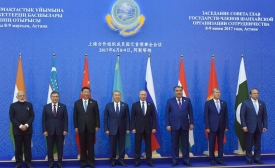shanghai cooperation organization

How India and Pakistan's membership in the Shanghai Cooperation Organization may ease tensions.
Dmitry Fedorovich Mezentsev, Secretary-General of the Shanghai Cooperation Organisation(SCO), visited New Delhi on a two day visit from February 23 to 25. The visit failed to attract any meaningful media attention. Nonetheless, the visit is significant and highlights the importance of the SCO in India’s larger relations with Central Asia and South Asia.
Though it has received comparatively little attention, one of the most profound geopolitical trends of the early 21st century is gathering steam: China’s pivot to Central Asia. As American military forces withdraw from Afghanistan and gaze toward the Asia-Pacific, and while Washington’s European allies put NATO’s eastward expansion on the back burner, Central Asia has become China’s domain of investment and influence.
On Friday leaders of Central Asian nations will meet at the Shanghai Cooperation Organization (SCO) summit in Bishkek, Kyrgyzstan. China arguably wields the most power of the countries involved, and the propaganda mills in Beijing are pumping out content hailing the importance of the upcoming meeting. In the end, though, what does it really mean for the Middle Kingdom?
As a matter of fact, the region’s leaders have also expressed a common fear that China’s financial aid might be a poisonous gift, that with this soft power, Chinese investments might lead to economic dependency and political vassalage.
According to the analysts and diplomats at the table, China's influence is based on cooperation, development and mutual interests. China's 'soft power' (a term that is not popular in Beijing) is its ability to let countries develop at their own rate.







